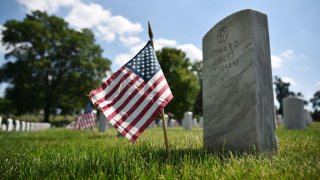
Throughout the U.S., many will be hosting Memorial Day celebrations this weekend and spending time with family and friends to commemorate the patriotic holiday.
But what does Memorial Day mean for Americans?
Here are some facts to brush up on the meaning of this Monday's nationwide day of remembrance:
Memorial Day Was Originally Named 'Decoration Day'
Feeling out of the loop? We'll catch you up on the Chicago news you need to know. Sign up for the weekly Chicago Catch-Up newsletter here.
In 1869, the head of an organization of Union veterans Maj. Gen. John A. Logan established Decoration Day as a way for the nation to honor the graves of those who died in the Civil War with flowers, according to the U.S. Veterans Affairs Department.
This is a portion of the official order written by Logan:
The 30th day of May, 1868 is designated for the purpose of strewing with flowers or otherwise decorating the graves of comrades who died in defense of their country during the late rebellion, and whose bodies now lie in almost every city, village, and hamlet churchyard in the land. In this observance no form or ceremony is prescribed, but posts and comrades will in their own way arrange such fitting services and testimonials of respect as circumstances may permit.
Local
May 30 Was Chosen as the Observation Day Because Flowers Are in Bloom
Logan was believed to have chosen May 30 as the day to observe Decoration Day because flowers would be in bloom nationwide, the VA website wrote.
Though there were future conversations over the official day for Memorial Day, by the end of the 19th century, state legislatures passed proclamations naming May 30 as the holiday.
Memorial Day Was Declared a National Holiday in 1971
In 1971, Congress declared Memorial Day a national holiday, placing it as the last Monday in May. According to the VA, the day was expanded to honor all those who have died in American wars.
Congress in December 2000 passed and the president signed into law "The National Moment of Remembrance Act," to ensure those who sacrificed their lives for the country were not forgotten.
The Official Birthplace of Memorial Day is Waterloo, New York
There are debates over which city was the origin of Memorial Day, although the first large observation was held at Arlington National Cemetery in Washington, D.C. for a crowd of about 5,000 in 1868.
In 1966, former President Lyndon Johnson declared Waterloo, New York the official "birthplace" of the holiday, according to the VA.
The National Moment of Remembrance is at 3 p.m. Monday
The National Moment of Remembrance, which asks that Americans pause in silence to honor those who have died serving the U.S., takes place at 3 p.m. on Memorial Day.



